
4 Steps to Set Up Magento 2 B2B Registration Form Extension
Are you looking for a simpler way to handle B2B registrations? Magento 2 B2B Registration Form helps make B2B customer registration simple. It collects key company details and automates the B2B sign process.
This tutorial will cover how the B2B registration form plugin streamlines operations.
Key takeaways
-
Key features make B2B registration easier and more efficient.
-
Optimizing metrics for sign-up process growth.
-
Easy steps guide the setup of a B2B registration form add-on.
-
Connect forms with other tools to improve their function.
-
Better design enhances the user experience.
-
Security measures keep Magento 2 customer data safe.
-
4 Steps to Set Up & Manage Magento 2 B2B Registration Form Extension
-
Integrating Magento 2 Registration Form Plugin with Other Business
-
11 Security Considerations for Registration Forms for B2B Customers
7 Key Features of Magento 2 B2B Registration Forms
1. Custom Fields
Custom fields help collect customer information more easily. It is simpler for wholesale customers to register. The extension allows store owners to add extra fields like:
-
Company name
-
Tax ID
-
Business address to the custom registration form.
For example, a wholesaler can use a login form. It can help gather all the company information needed during sign-up. This ensures that only verified businesses can access their ecommerce B2B features.
2. Approval Workflow
The extension for Magento 2 lets the store admin approve or disapprove new B2B accounts. It gives retailers control over who can access B2B pricing and features. For example, when a business applies for a customer account on a B2B website. The site operator reviews the details during sign-up. They then decide if the business should proceed to the access stage. This ensures only legitimate companies can register.
3. Customer Group Assignment
Once a Magento 2 company account is approved. The registration form plugin automatically places the account into the right customer group. For example, a fashion retailer places wholesale users into a group that gets bulk discounts. It is based on their business information. The B2B form add-on also lets them offer specific pricing and promotions. It helps Magento 2 store owners organize B2B and B2C customers.
4. Mobile-Responsive Design
The default Magento 2 registration form is not made for mobile devices. A B2B extension with a mobile-responsive registration page is important. The feature ensures the application form works well on phones and tablets. For instance, a construction company buyer registers from their phone in the field. It makes Magento an essential responsive sign-up form.
5. Integration with Third-Party Systems
The B2B registration form for Magento connects with third-party extensions. It includes CRM integration and ERP systems. They help retailers improve the sign-up process. It automatically syncs new customer accounts across systems. For example, a B2B business using Salesforce integration can link the account form. It adds new accounts to their CRM, cutting down on manual entry.
6. Automated Notifications
The module sends automatic notifications to both the site admin and the customer. It tells about the customer's B2B approval status. This keeps the sign-up process clear and reduces the need for follow-ups. For example, a wholesale user who signs up for a business account. They will get an email when their sign-up is approved. The store admin gets a notification in the customer grid.
7. Security Features
Security is key for any business handling sensitive wholesale customer data. The B2B registration form extension includes features. It includes CAPTCHA integration and encryption to block bots and hackers. For instance, a healthcare supplier uses these security tools. It keeps the company's information safe. The add-on also ensures that the registration form for wholesalers meets regulations.
Optimizing Metrics for the B2B Registration Process Growth
1. Conversion Rate
Conversion rate is an important metric for every B2B e-commerce business. It shows the percentage of website visitors who complete an action. It includes visitors making a purchase or signing up using a sign-up form for B2B customers. Tracking conversion rates helps to see how well the marketing site is driving B2B sales.
-
Why track it: Conversion rates show the effectiveness of marketing and website improvements. They help measure how well visitors are converting into customers.
-
How to calculate it: Conversion rate = (No. of conversions / Total number of website visitors) x 100.
Strategies to improve it:
-
Add clear, persuasive calls to action (CTAs) to guide users toward submitting the form.
-
Build trust by displaying customer testimonials, certificates, or security badges.
-
Use tools to manage pricing and collect customer data with customizable forms.
2. Average Order Value (AOV)
AOV shows how much customers spend per transaction on your wholesale platform. A higher AOV means more revenue without needing new customers.
-
Why track AOV: Knowing AOV helps you customize marketing to encourage larger purchases. It also helps identify upselling and cross-selling chances.
-
How to calculate it: AOV = Total revenue / Number of orders.
Strategies to increase it:
-
Offer discounted bundles or suggest related products at checkout.
-
Use tiered pricing so every B2B account gets bigger discounts when they buy more.
-
Leverage Magento 2 extension tools to set prices, tiered pricing, and percentage discounts.
3. Website Traffic
In today’s world, every B2B customer prefers to research and buy online. Website traffic measures how many visitors come to your wholesale site over a set period.
-
Why track it: More traffic boosts the site’s visibility. It brings in more potential company accounts. Monitoring traffic sources helps you see which marketing efforts work best.
-
How to measure it: Use tools like Google Analytics to track traffic sources and bounce rates.
Strategies to increase it:
-
Use SEO and content marketing to make your site more visible in search engines.
-
Conduct keyword research to improve your meta tags, titles, and descriptions.
-
Drive traffic through social media and email campaigns. It boosts interest in your registration form for Magento 2.
4. Customer Acquisition Cost (CAC)
CAC measures the cost of gaining new customers. It helps you understand how efficient your marketing and sales efforts are.
-
Why track it: CAC helps you measure the return on investment (ROI) of your marketing. It can guide you on where to spend your resources for the best impact.
-
How to calculate it: CAC = Total sales and marketing costs / Number of new customers.
Strategies to optimize it:
-
Segment customers based on customer demographics, preferences, and behaviors.
-
Focus on attracting high-value business accounts that fit your business goals.
-
Use tools to gather key company account information. It can be done through an easy-to-use account form for B2B users.
5. Customer Retention Rate (CRR)
CRR measures how effectively your business retains customers over time. It indicates your success in building lasting relationships with both B2B and B2C customers.
-
Why track it: Keeping customers costs less than getting new ones. A high CRR means steady revenue over time.
-
How to calculate it: CRR = ((No. of customers at the end of a period – New customers acquired during that period) / No. of customers at the start of the period) x 100.
Strategies to improve it:
-
Offer proactive customer support, solving problems before they grow.
-
Create feedback loops to learn how you can improve your services.
-
Develop loyalty programs to reward business sales and encourage repeat business.
6. Cart Abandonment Rate (CAR)
CAR measures how many users add items to their cart but leave without completing their purchase. It shows where customers might face issues during checkout.
-
Why track it: Tracking CAR helps spot and fix problems in the Magento checkout process. It leads to more completed purchases.
-
How to calculate it: CAR = (1 – (Completed purchases / Created carts)) x 100.
Strategies to improve it:
-
Clarify the checkout process with tools that offer an easy one-page order form.
-
Use targeted emails to recover abandoned carts. It encourages B2B customers to finish their purchases.
-
Add exit-intent pop-ups to remind customers to complete their orders.
4 Steps to Set Up & Manage Magento 2 B2B Registration Form Extension
Step 1: Setting Up the B2B Form in Frontend
-
Add B2B Registration Form:
-
The admin can include a B2B account form next to the default enrollment form.
-
This form has additional fields to gather more information about B2B users.
-
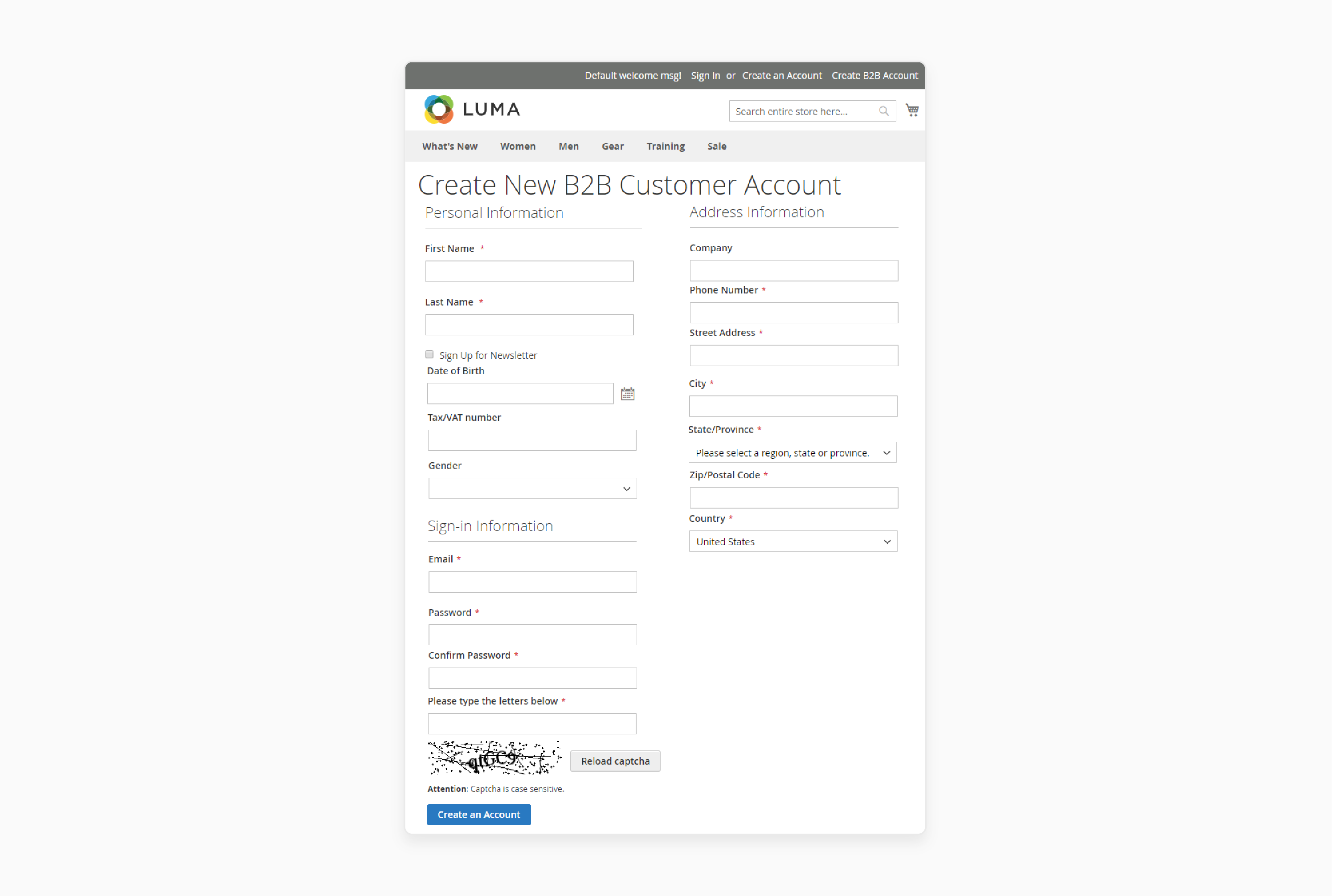
-
Review and Approval:
-
The admin can review and either approve or reject the sign-up. Unlike the default process, accounts are not activated automatically.
-
Once users submit the registration form, they see a "Pending" message.
-
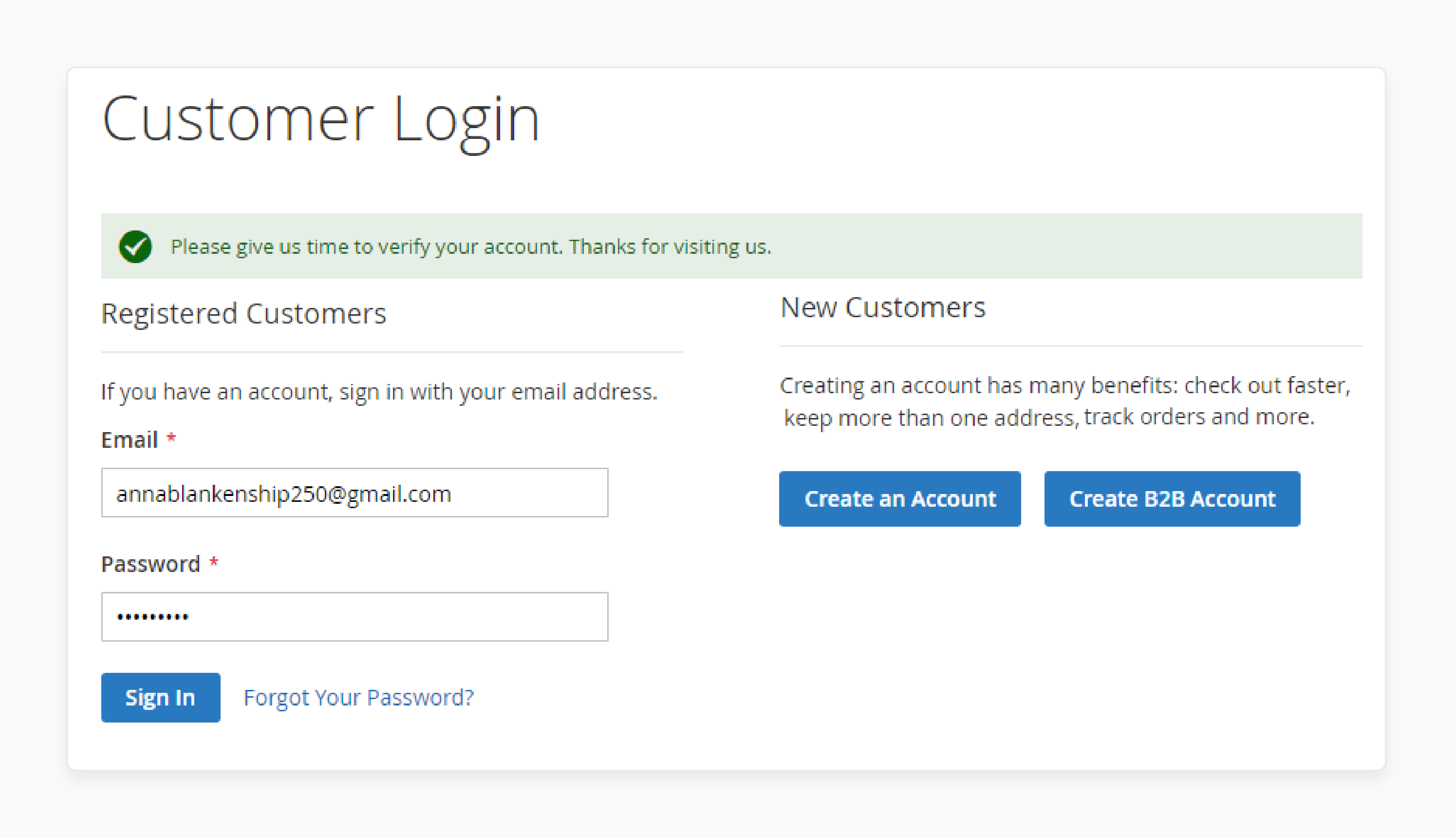
-
Notification System:
-
The admin gets an email notification for each new sign-up.
-
If approved, the user gets an approval email.
-
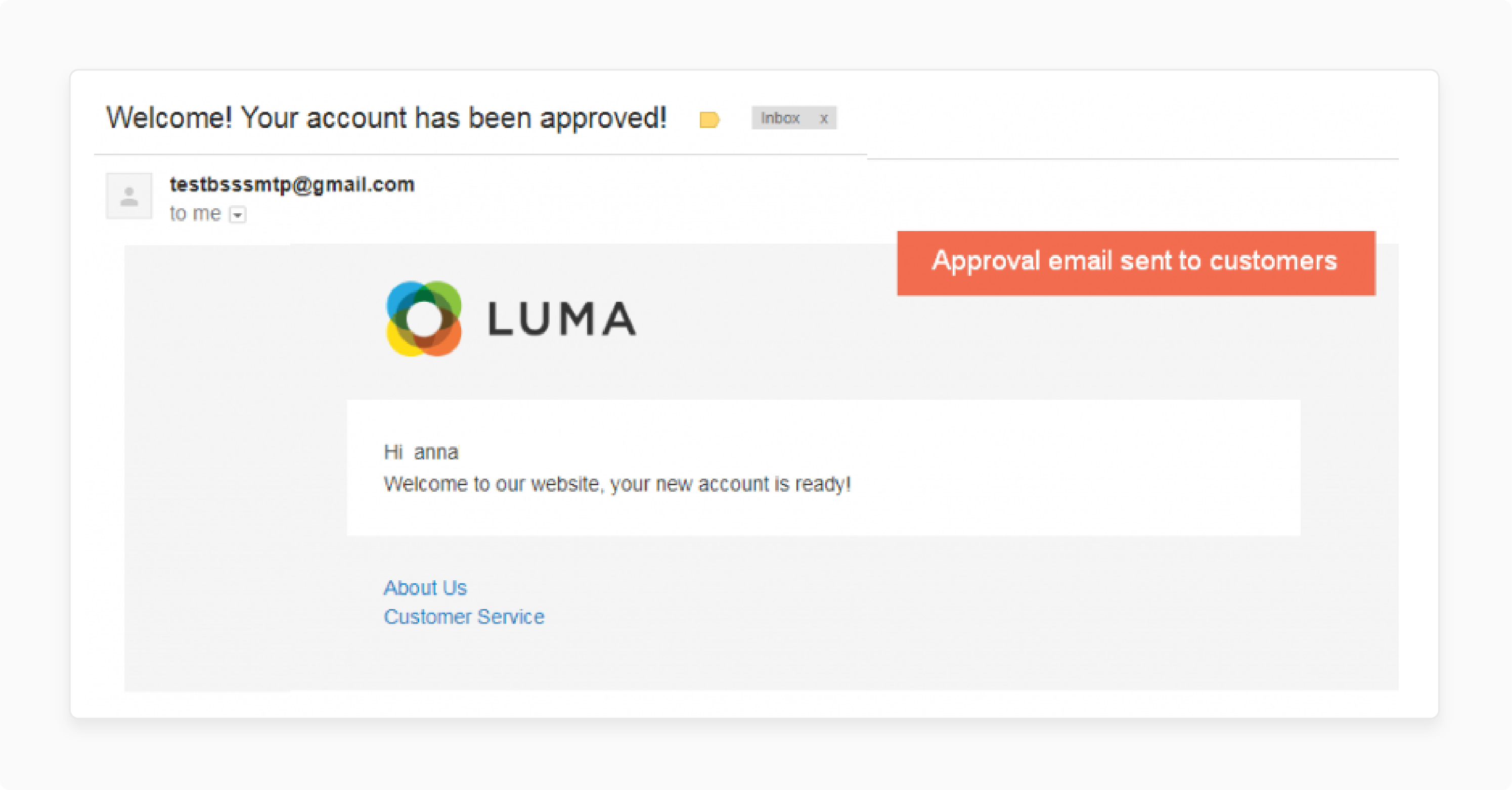
- If rejected, the user gets a disapproval email. They will see an error message when they try to access their account.
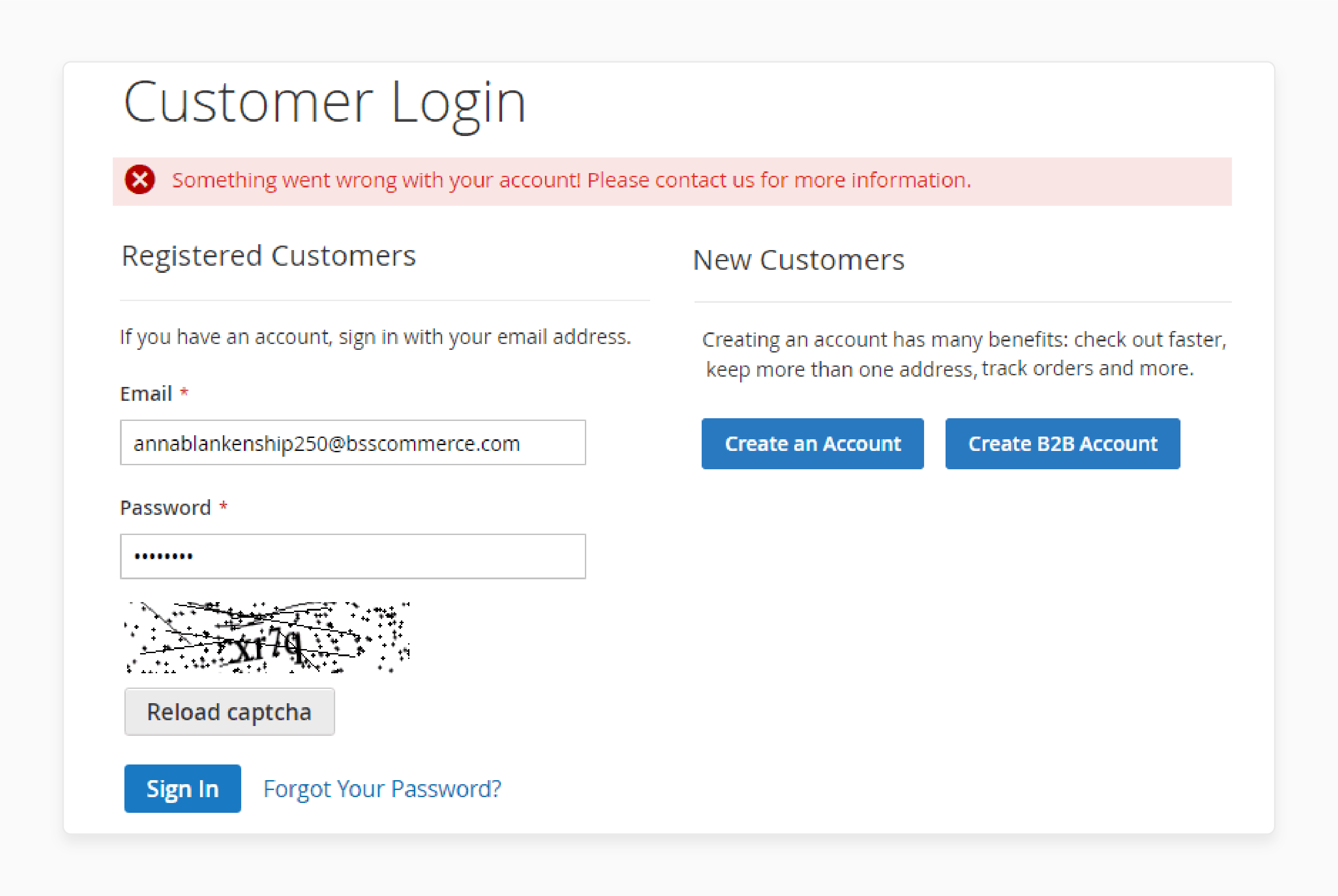
Step 2: Setting Up the B2B Form in the Backend
General Configuration
Step 1: Enable the Module:
-
Go to Stores > Settings > Configuration > Provider Name > B2B Registration.
-
Set Enabled to "Yes" to activate the module.
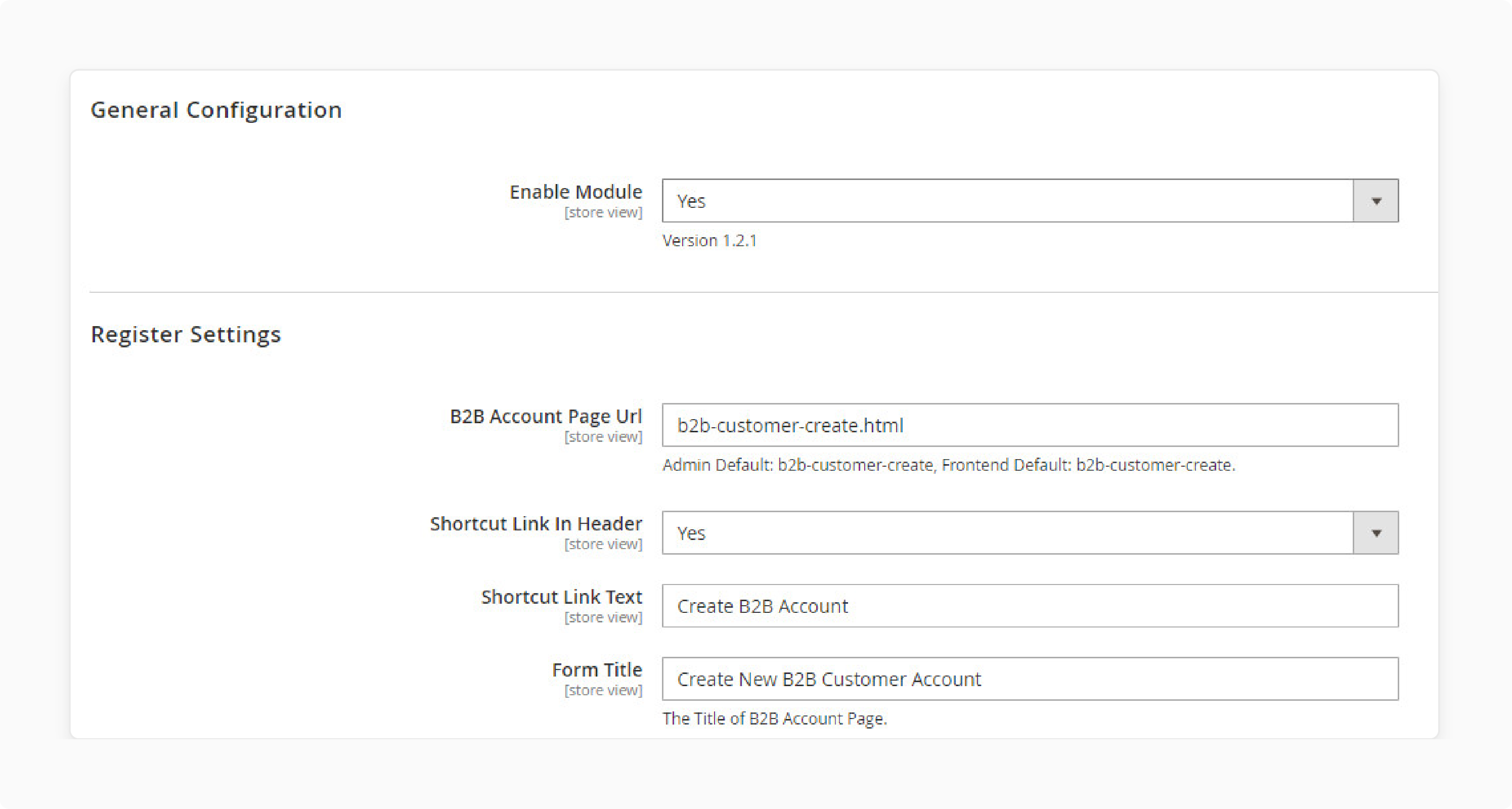
Step 2: Register Settings:
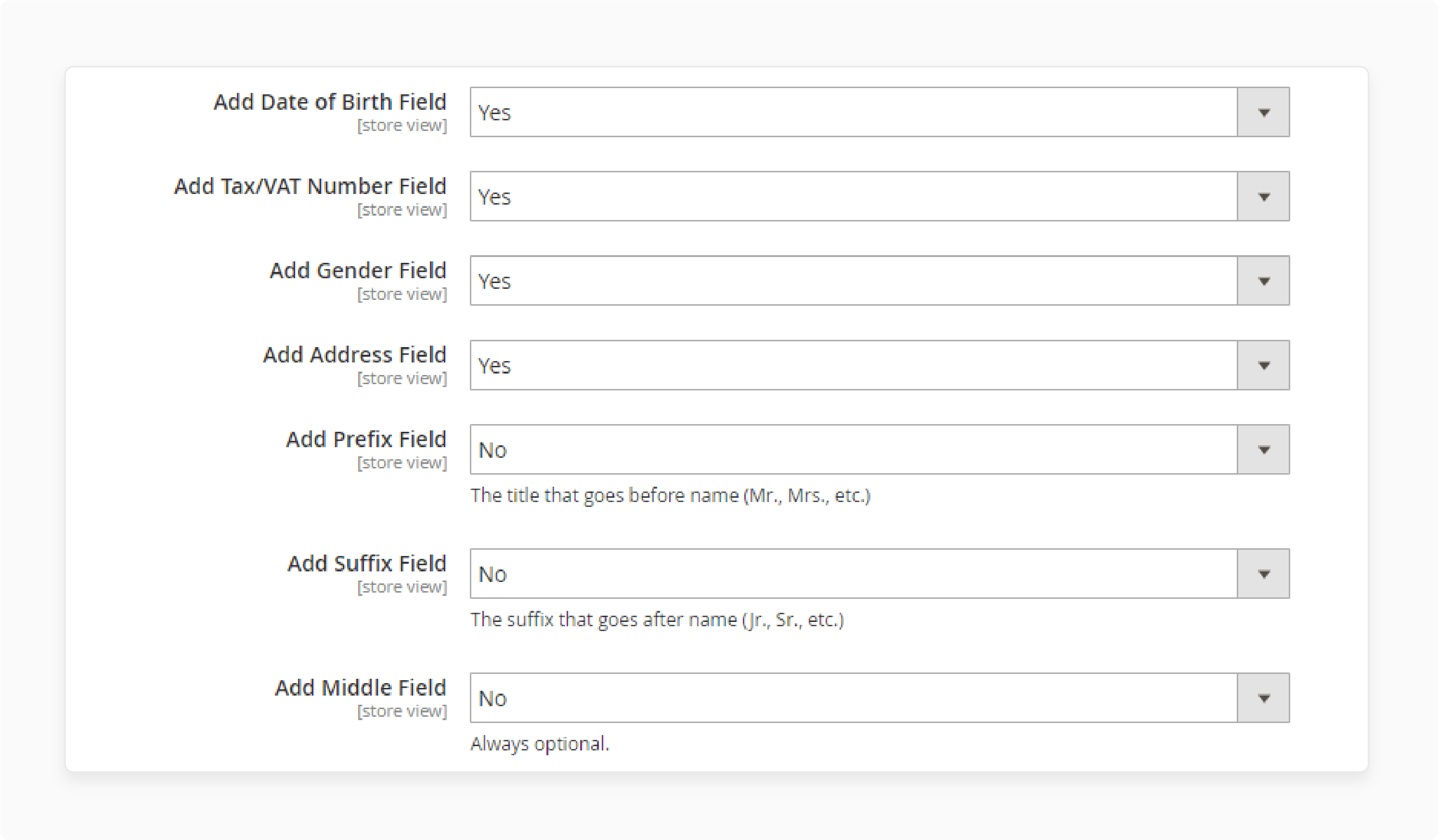
-
B2B Account Page URL: Enter the URL for the customer sign-up page.
-
Shortcut Link in Header: Set this to "Yes." It helps to show a shortcut link in the header for easy access to the sign-up page.
-
Form Title: Add a title for the registration form.
-
Additional Fields: Select the extra fields you want to include in the form. These fields are not required by default.
Customer Groups Configuration
Step 1: Default Customer Group:
- Select the customer group to which the new B2B sign-up will be assigned.

Step 2: Disable Regular Registration:
-
Choose "Yes" to hide the regular "Create an Account" links in the header, sign-in, and checkout pages.
-
Show the registration link instead.
Approval Settings
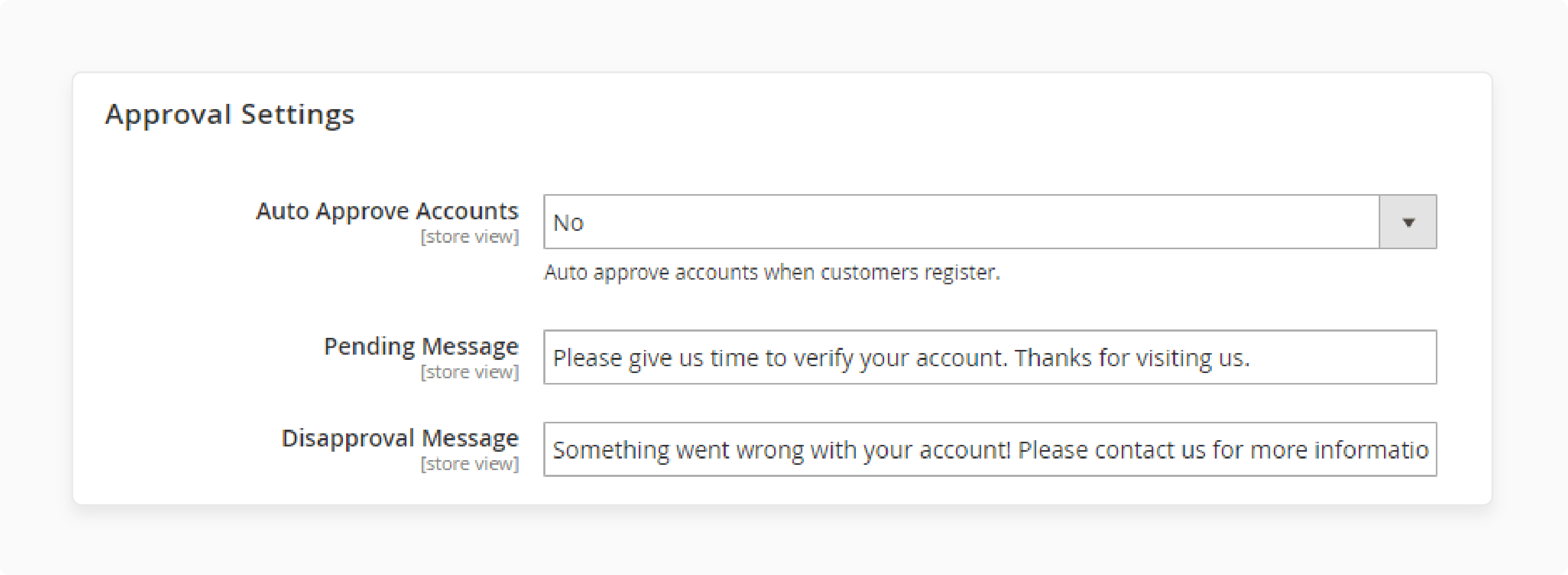
Step 1: Auto-Approve Accounts:
-
Set Auto Approve Accounts to "Yes" if you want your business account approved automatically.
-
Set "No" if you prefer manual approval.
Step 2: Pending and Disapproval Messages:
- Write the messages users will see when their sign-up is pending or disapproved.
Admin Email Settings
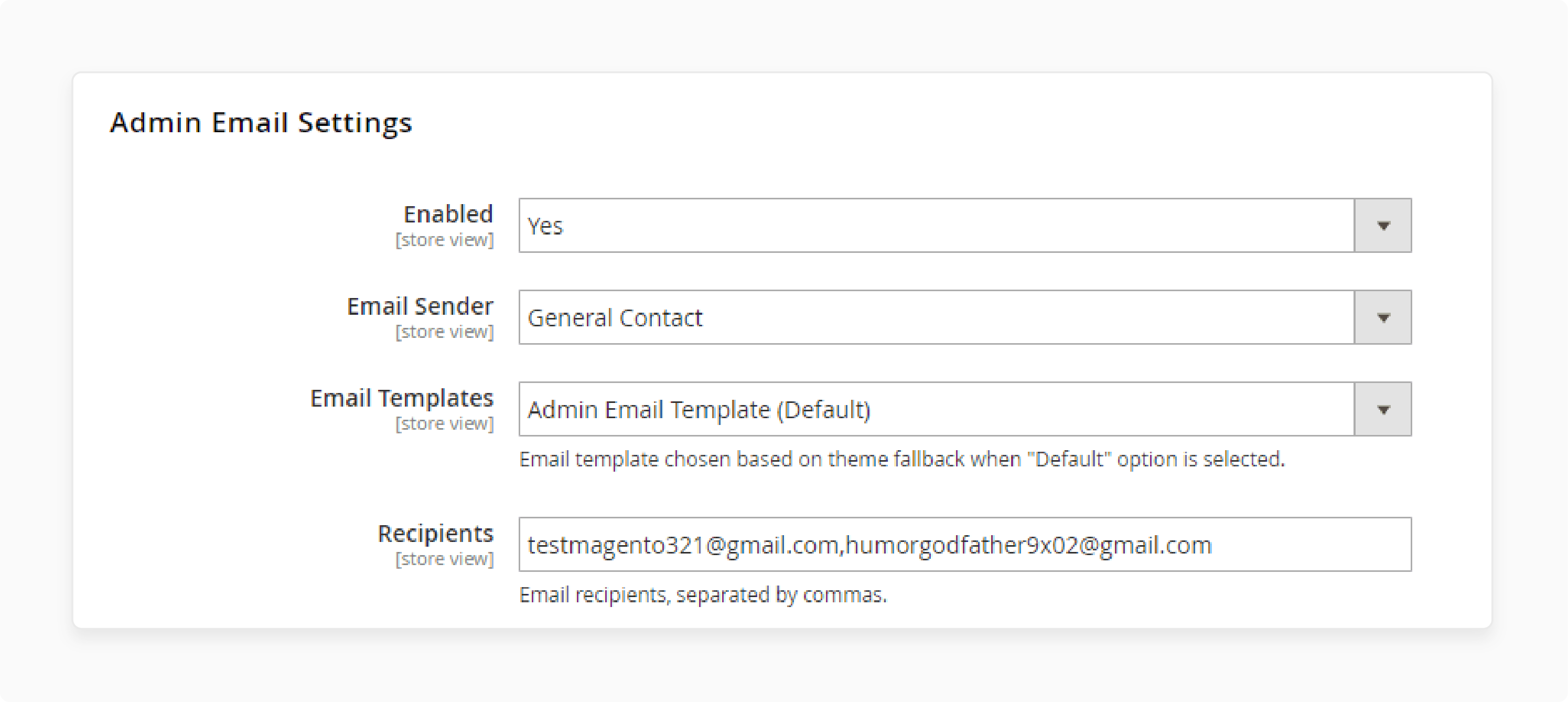
Step 1: Enable Admin Email Notifications:
-
Set Enabled to "Yes" to send admin email notifications.
-
Choose the email template to notify the admin of the new B2B sign-up.
-
Enter the email addresses (separated by commas) of those who will receive the notifications.
Customer Email Settings
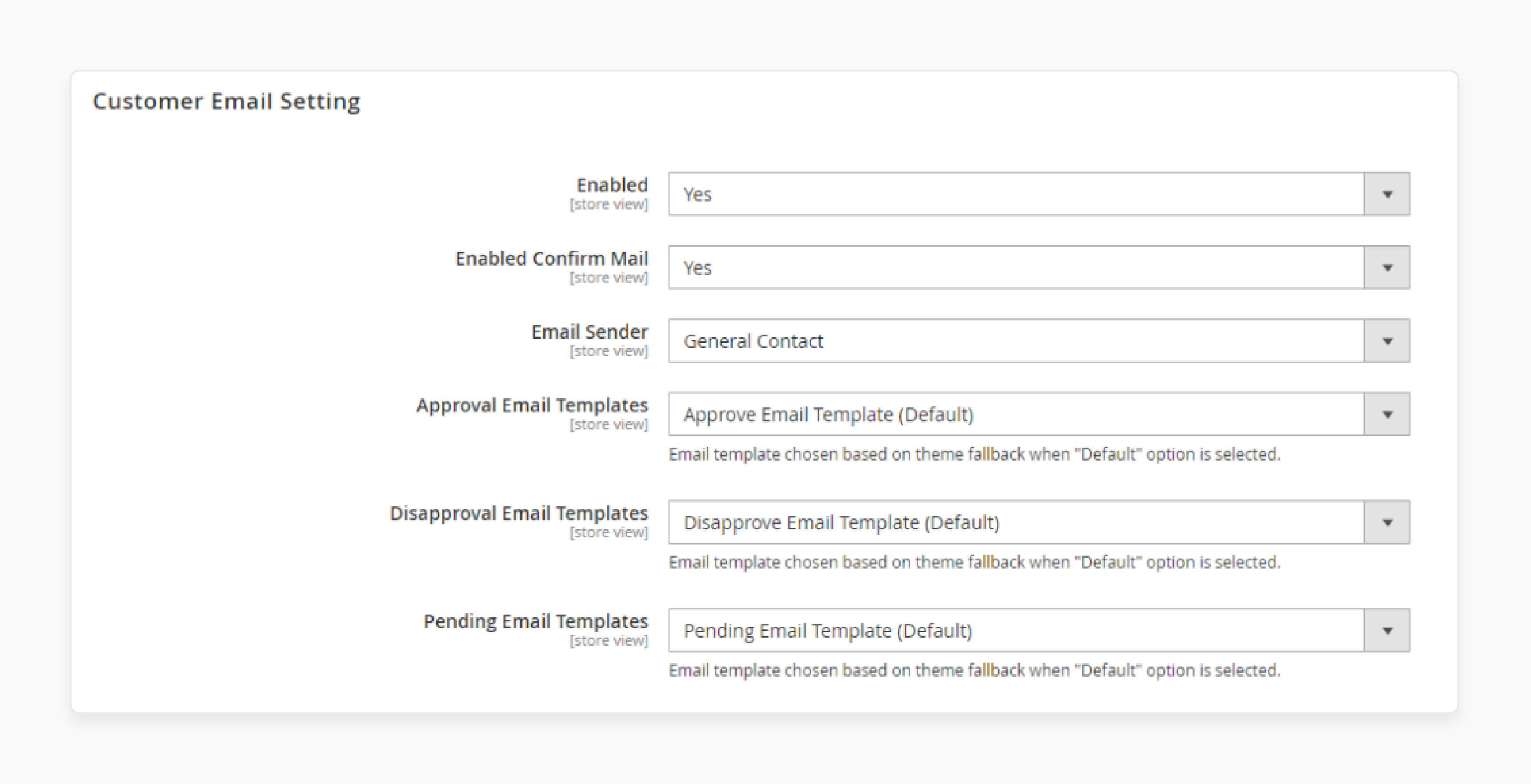
Step 1: Enable Customer Notifications:
-
Set Enabled to "Yes" to send notification emails after their sign-up is processed.
-
Choose the email templates for approval, disapproval, and pending status notifications.
CAPTCHA Configuration
Step 1: Enable CAPTCHA:
- Go to Stores > Configurations > CUSTOMERS > Customer Configuration > CAPTCHA.
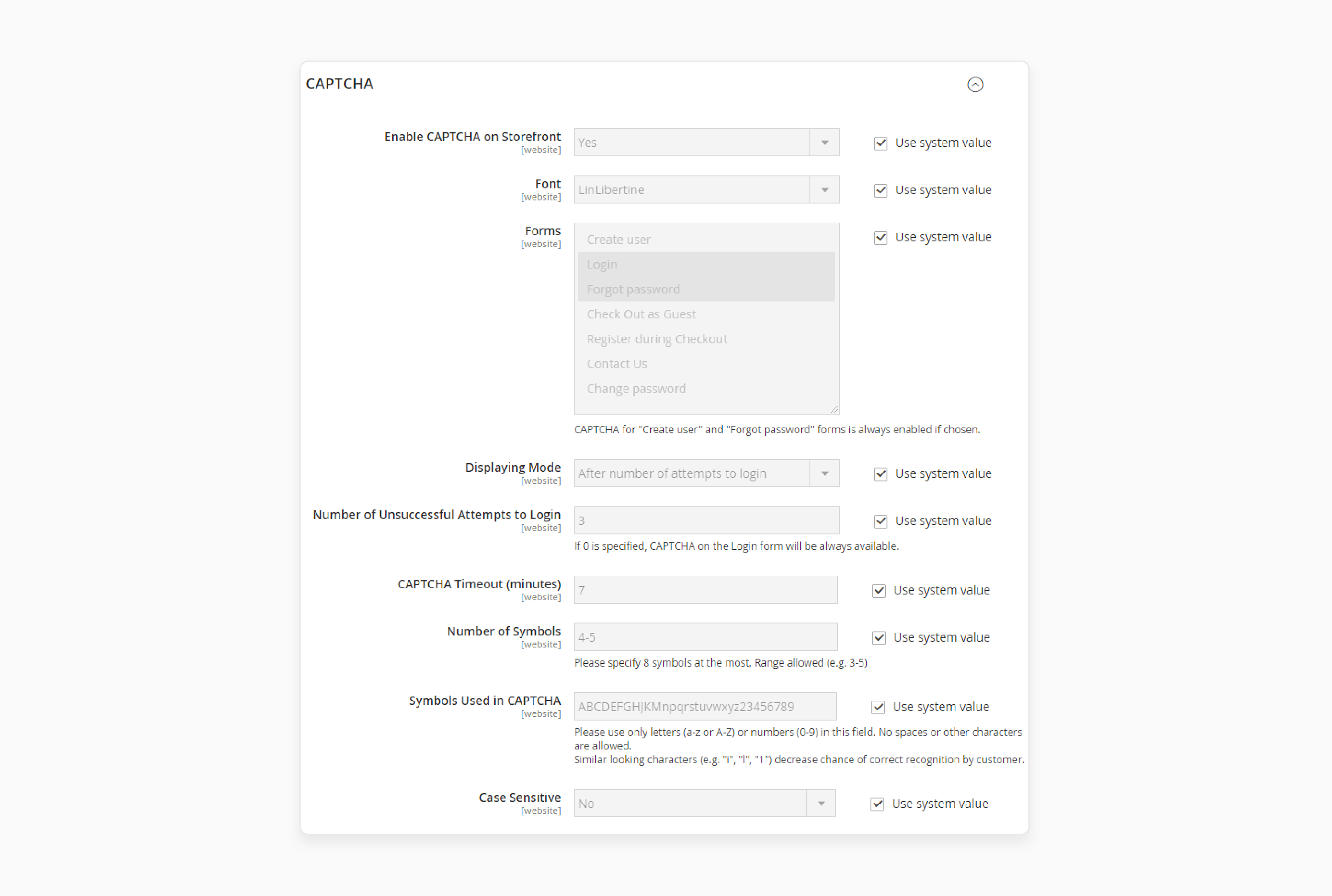
- Set Enable CAPTCHA on Storefront to "Yes."
- Choose Create User Form in the Form option to add CAPTCHA to the B2B account form.
Step 3: Managing Business Registrations in the Backend
1. Check Account Status:
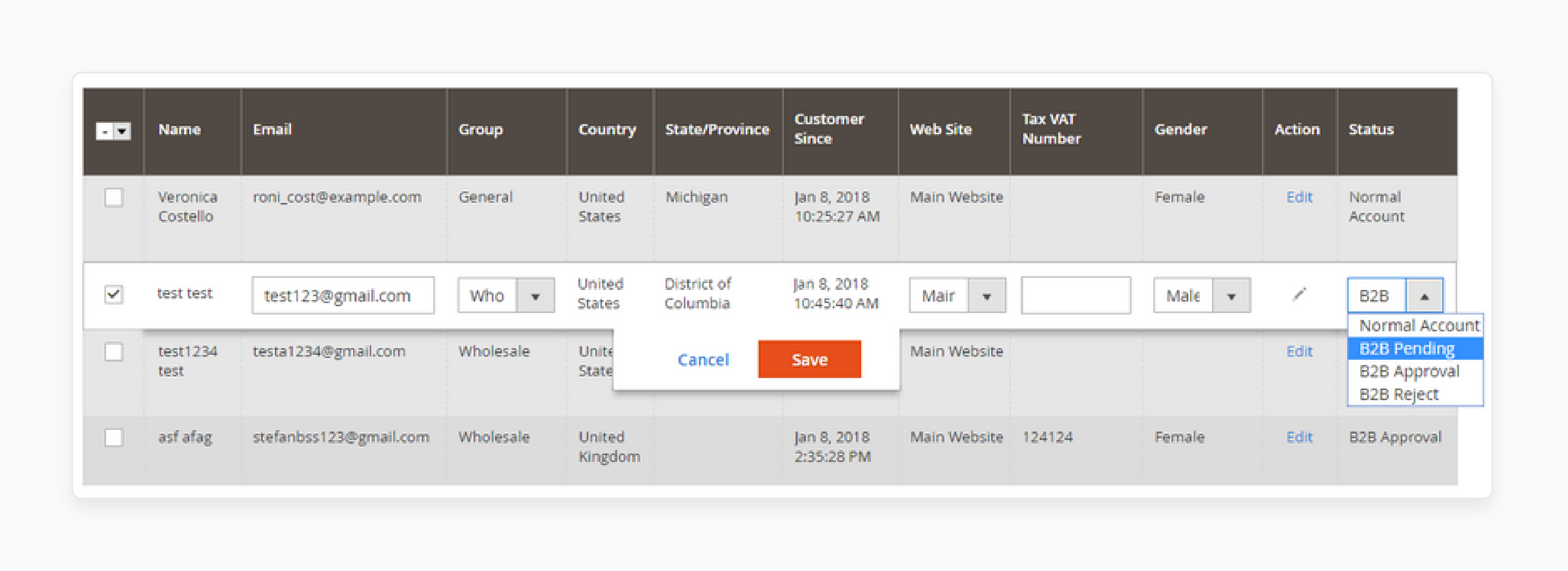
- In the Customer Grid, a "Status" column will show the approval status of the business accounts.
2. Update Account Status:
-
You can change the status of the account by double-clicking the status field in the row.
-
You can also update multiple accounts at once using mass actions.
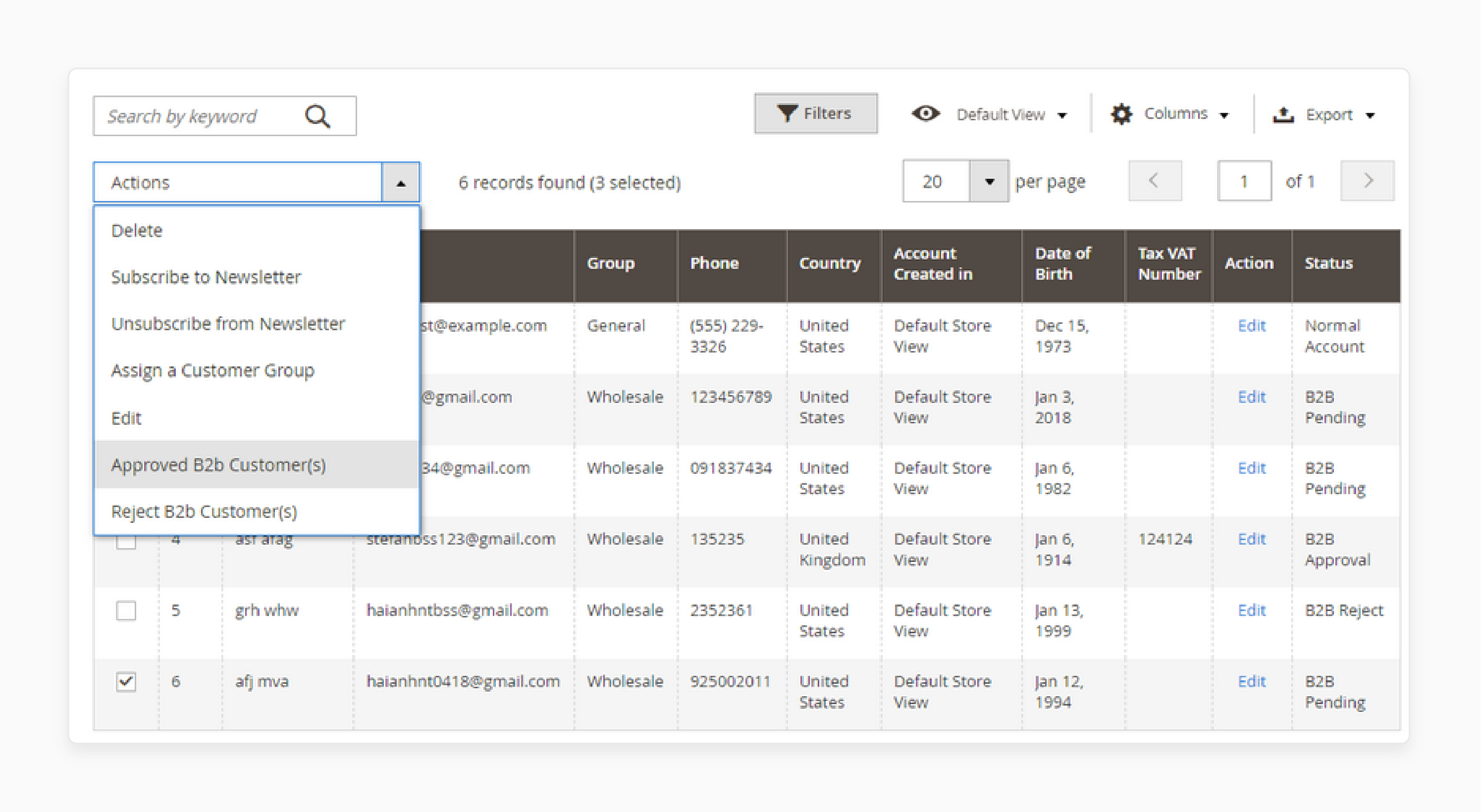
Step 4: Creating Widgets for B2B Forms
1. Create a Widget:
- Go to Content > Widget.
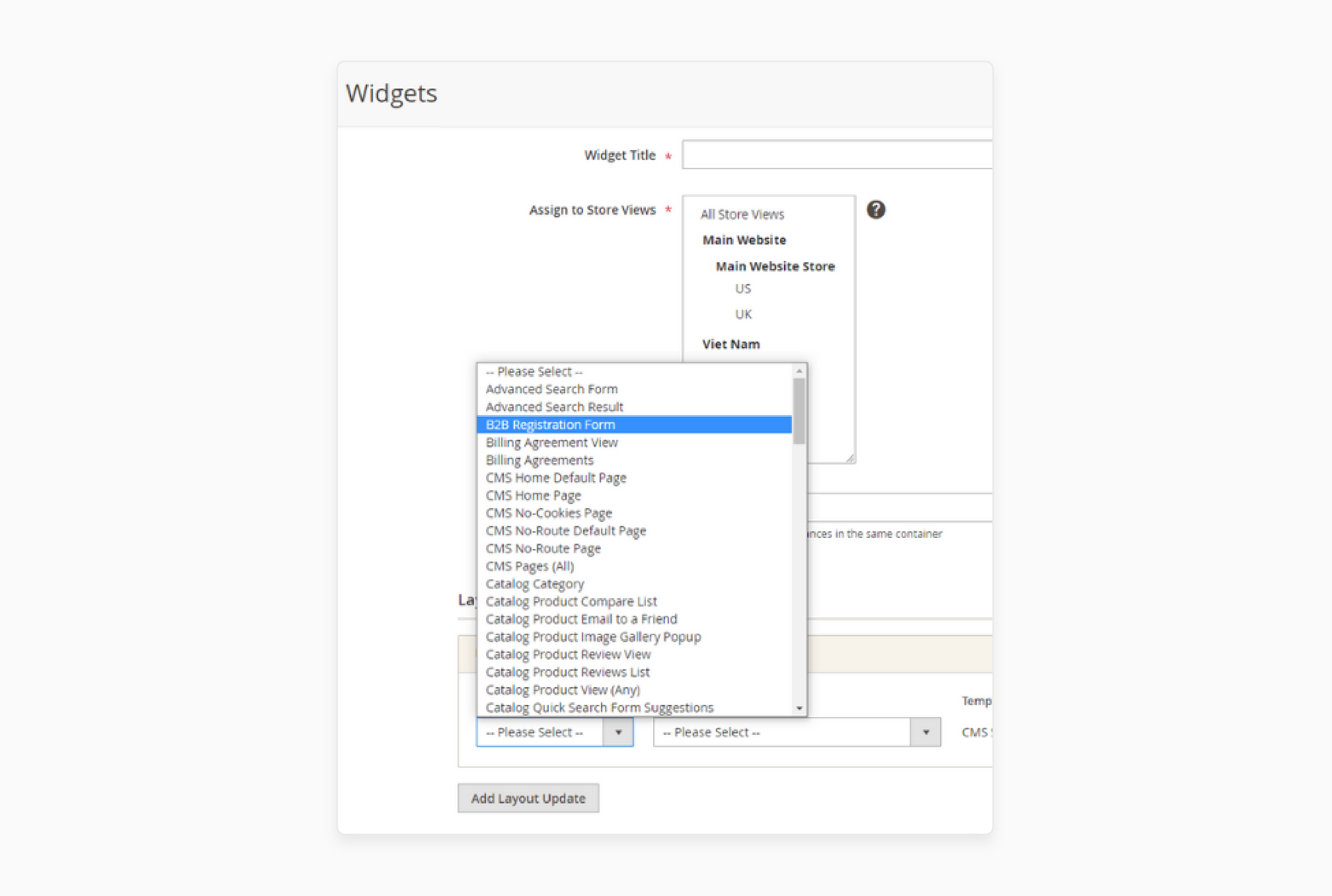
- Select the Business Registration Form as the page type for the widget.
- Choose where to display the form, either on a page or within a block.
Additional Notes:
-
Admin-Created Accounts: When the admin creates an account in the backend. The customer will receive an approval email after the account is created. If the operator changes the account status to "B2B Approval." The customer will receive another notification email.
-
Company Account Integration: If the Magento 2 Company Account module is installed. Customers can register as a company by selecting "Register as a Company Account." The option can be selected during sign-up.
Integrating Magento 2 Registration Form Plugin with Other Business
| Integration Type | Details |
|---|---|
| API Integration | The plugin allows connections to external systems using REST API and GraphQL. Set up API endpoints to exchange data between the B2B form and other platforms. The add-on helps automate data flow, improving efficiency. |
| Single Sign-On (SSO) | Implement Magento 2 SSO to allow customers to use one set of credentials across systems. It simplifies the registration process by reducing multiple logins. This improves security and provides easier customer access. |
| CRM Integration | Connect the account form to CRM systems to collect customer information more effectively. Automatically create new leads. Map the fields to the account form to ensure smooth data transfer to your CRM. |
| Custom Workflows | Use extensions or customizations to create workflows that interact with other systems. Trigger actions like credit checks after Magento registers a customer. These workflows simplify the registration process before creating B2B accounts. |
| ERP Integration | Integrate the account form with the ERP system to create B2B customer accounts. Sync details like company name and tax ID to manage the B2B operations efficiently. It ensures accurate records. |
| Data Synchronization | Set up bi-directional syncing to collect customer information. Make sure it is between Magento 2 configurable form add-ons and other systems. This keeps data updated and accurate across platforms. |
| Marketing Automation | The registration form plugin allows integration with marketing platforms. Trigger welcome emails and nurture campaigns. Automatically add B2B users to mailing lists. The plugin supports better customer engagement and follow-up. |
| Reporting Integration | Connect the B2B account form data to reporting tools. The extension offers insights into important events and trends for accounts. It helps improve customer acquisition. |
| Analytics Integration | Connect the B2B account form data to ecommerce analytics like Google Analytics. Track key metrics like important events for accounts and conversion rates. It helps you optimize the registration process and make data-driven decisions. |
Enhancing User Experience in Magento Registration Forms
1. Simplify the Form Fields
-
Keep essential fields: Allows the important information at the start. You can gather more details later through follow-up forms.
-
Use auto-fill: Let users create registration forms faster. It enables auto-fill, reducing the need to re-enter information.
-
Group fields logically: Organize the fields for a separate account form for B2B customers. Grouping related fields makes it easier for users to fill out the form.
2. Use Clear Labels and Instructions
-
Clear labels: Ensure each field in the B2B account form url has clear, simple labels. Avoid technical terms that could confuse users.
-
Add help text: Use brief instructions or tooltips for complex fields. It includes assignments to customers, to help users understand what’s needed.
3. Add Real-time Validation
-
Instant feedback: The extension facilitates real-time feedback. Show users if they have filled fields correctly or need to fix errors right away.
-
Reduce errors: Using add-ons and real-time validation helps users avoid mistakes. It leads to fewer rejected forms.
4. Optimize for Mobile
-
Responsive design: Make sure your form on the website in clicks works well on all devices. It should adjust to different screen sizes to make it easy for mobile and tablet users to complete.
-
Use larger buttons: Add bigger buttons and input fields for mobile users. It reduces mistakes when filling out forms on small screens.
5. Allow Social or SSO Registration
-
Social Access: Let users sign up using their social media accounts to clarify the process. It speeds up the B2B account form process.
-
SSO integration: Implement Magento Single Sign-On to allow separate customers to log in. It ensures that users have access across systems with the same credentials.
6. Enable Save and Continue
Save progress: With the Magento 2 registration, users can save their progress. They can even return later to finish the form. It is helpful for longer forms or complex information.
7. Provide Visual Cues
-
Required fields: Use an asterisk (*) or color labels to show required fields. It is a separate account form for B2B users and helps users know which fields must be filled.
-
Icons for guidance: M2 extensions deal with helpful icons. It includes a calendar icon for date fields to guide users through the form.
8. Test and Optimize Performance
-
A/B testing: Use Adobe Commerce extensions to run tests on different form designs. It helps you find the best layout to optimize the sign-up experience for users.
-
Fast load times: Make sure your B2B account form loads quickly on all devices. Faster forms reduce the chances of users abandoning the process.
11 Security Considerations for Registration Forms for B2B Customers
1. HTTPS Encryption
Always use HTTPS on all pages with the B2B registration form url. It encrypts data between the user’s browser and your server. HTTPS helps protect sensitive details like business information and login credentials. It keeps attackers from intercepting or changing data during transfer. HTTPS keeps assignment to user information safe.
2. Input Validation and Sanitization
Apply strict validation and sanitization on all fields within the B2B account form. It prevents attacks like SQL injection and cross-site scripting (XSS). Use add-ons along with Magento’s validation tools to ensure only clean data is accepted. Adding custom validation for special fields adds extra security.
3. CAPTCHA / reCAPTCHA
Add CAPTCHA or Google reCAPTCHA to block bots. It automated submissions on separate account forms for B2B users. This cuts down on spam and prevents unwanted sign-ups. It integrates the CAPTCHA and supports Google reCAPTCHA v2 and v3 for security.
4. Rate Limiting
Set up rate limiting on the B2B account form url to control submissions. It can limit how many submissions can come from a single IP within a set time frame. This prevents force attacks or denial of service attempts from overwhelming your system. The Commerce add-ons can help you set these limits to protect your form from abuse.
5. Secure Password Policies
Enforce strong password rules for users registering through the B2B account form. Require at least 12 characters, including upper and lowercase letters, numbers, and symbols. It ensures that users create registration accounts with strong security. This reduces the risk of weak passwords.
6. Two-factor authentication (2FA)
Add two-factor authentication (2FA) to accounts created through the B2B account form. After users get the extension, 2FA adds extra security. It requires a second step, such as a code sent to their phone. This makes it harder for attackers to access the account even if they have the password.
7. Approval Workflow
Set up a manual approval process for new sign-ups. Admins can review the assignment to customer information and confirm before activation. It helps prevent fraudulent sign-ups by allowing careful checks before granting access.
8. Secure Data Storage
Keep separate customer data collected from the B2B enrollment form securely stored. Encrypt sensitive details like personal and company information in the database. Use Magento’s built-in encryption or add extra layers for more security. Regularly back up data from your website in clicks to protect it from breaches or loss.
9. Access Control
Use role-based access control (RBAC) to limit who can view or manage data from the B2B form. Only authorized admins should have access to customer information. Keep logs of all changes made to ensure accountability and data protection.
10. Regular Security Audits
Run regular security audits on your B2B enrollment form. It includes penetration tests, code reviews, and vulnerability assessments. The Adobe Commerce extensions can help find and fix potential weaknesses.
11. Compliance with Regulations
Ensure that your B2B enrollment form complies with regulations like GDPR and CCPA. Get clear consent for data collection and give users control over their data. Following the rules protects business and builds trust to optimize the registration process.
FAQs
1. What is a B2B Signup Form in Magento 2?
A signup form lets retailers collect important information from B2B customers. The configurable form can ask for details like firm account info. It helps improve the sign-up process for business sales.
2. How does the BSS Magento 2 B2B Registration extension help store owners?
The BSS sign-up extension helps by creating a flexible b2b enrollment form. The extension is great for business sales as it is simple and optimizes the sign-up process.
3. Can I create a custom B2B Signup Form in Magento 2?
Magento 2 lets you create a configurable form for signup. It uses a B2B sign-up extension. This gives retailers control over the b2b application form. They are allowed to add fields for company account details.
4. What are the benefits of using custom forms to optimize the sign-up process?
Using a custom form builder helps stores to optimize the sign-up process for business sales. These forms let retailers collect the needed information. It makes the b2b sign process faster and more effective.
5. What information should be included in a Magento 2 B2B creation Form?
A B2B enrollment creation form includes company account info, contact details, and other data for business sales. With a Magento 2 configurable form plugin, retailers can add the fields their business needs.
6. How can Magento 2 configurable form add-ons help with B2B sales and login?
Magento 2 configurable form add-ons make the sign and login processes easier. With Magento Extensions providers, stores can create forms that optimize the process. It helps B2B customers log in easily and improves business sales.
Summary
Magento 2 B2B Registration Form helps businesses create a simple sign-up process. It lets retailers collect important company details and optimize the sign-up process. The form is customizable and improves the B2B customer experience. Consider the following features:
-
Custom Fields: Add fields like firm name and tax ID for easier sign-up.
-
Approval Workflow: Admin approves or rejects business accounts before access is given.
-
Customer Group Assignment: Automatically assign approved accounts to the right group.
-
Mobile-Responsive Design: Ensure the sign-up form works well on phones and tablets.
-
Automated Notifications: Send automatic emails on B2B account approval status.
Explore managed Magento hosting to optimize your store with B2B registration form extensions.





